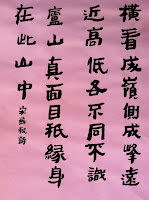A calligraphy writing of Wang Suvit of a poem written by
Yang Wanli
(or Yang Wan-Li, 楊萬里; 1127–1206) who was a
Chinese poet, born in Jiangxi.
He was one of the "four masters" of Song Dynasty poetry.
Written during the final exile of the Song to Hangzhou,
Yang Wanli's poems celebrate the beauties and
mysteries of nature, flora and fauna, much as the famed Song painters
did.
But they also querulously and wittily illuminate the annoyances and
pleasures of everyday life. Wikipedia.org
Calligraphy_9105
小池 【宋】楊萬里
泉眼無聲惜細流,
樹陰照水愛晴柔。
小荷才露尖尖角,
早有蜻蜓立上頭。
____________________________
Read more of Yang Wanli's poems
Ancient Chinese Musical Instruments, Classical Tunes Vol. 1
Poem by He Zhizhang






















